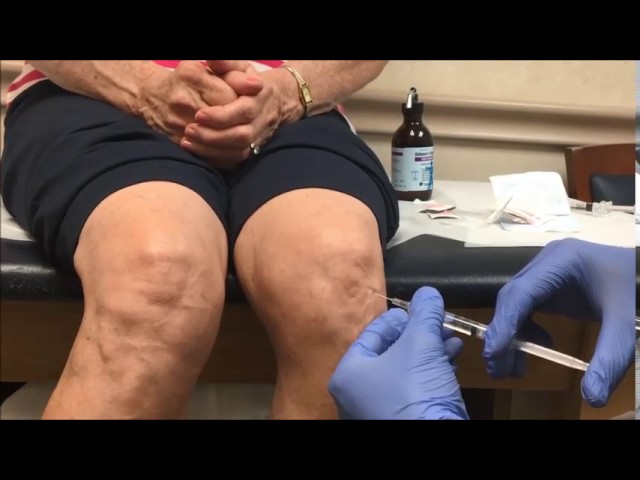Mobility The Benefits of Knee Gel Injections
What Are Knee Gel Injections?
Knee gel injections, also known as viscosupplementation, are a non-surgical treatment option for individuals suffering from knee osteoarthritis. These injections involve the introduction of a gel-like substance into the knee joint to provide relief from pain and improve mobility.

How Do Knee Gel Injections Work?
Knee gel injections typically contain hyaluronic acid, a natural substance found in joint fluid that acts as a lubricant and shock absorber. When injected into the knee joint, it helps restore the cushioning and lubrication that may have been lost due to osteoarthritis.
Who Can Benefit from Knee Gel Injections?
Knee gel injections are often recommended for individuals with knee osteoarthritis who haven’t found relief from other treatments such as pain medication or physical therapy. They can be particularly beneficial for those experiencing knee pain and limited mobility.
Pain Relief and Improved Mobility
One of the primary benefits of knee gel injections is the significant reduction in knee pain, which allows individuals to regain their mobility and engage in activities they may have avoided due to discomfort. This relief can lead to an improved quality of life.
Non-Surgical Alternative
Knee gel injections offer a non-surgical alternative for individuals who want to avoid or delay knee replacement surgery. This less invasive option can provide relief without the risks and recovery time associated with surgery.
Minimal Side Effects
Knee gel injections are generally well-tolerated with minimal side effects. Common side effects, such as mild pain or swelling at the injection site, are typically short-lived and resolve on their own.
Delaying the Need for Surgery
For some individuals, knee gel injections can effectively delay the need for knee surgery, allowing them to enjoy an active lifestyle without the constraints of surgery and rehabilitation.
Risks and Considerations
Potential Risks of Knee Gel Injections
While knee gel injections are generally safe, there are some potential risks to be aware of. These may include infection, bleeding, or an allergic reaction. It’s essential to discuss these risks with your healthcare provider before undergoing the procedure.
The Knee Gel Injection Procedure
Understanding the knee gel injection procedure is crucial for individuals considering this treatment. It typically involves a series of injections into the knee joint over a specified period. Your healthcare provider will explain the details and answer any questions you may have.
What to Expect After Knee Gel Injections
After receiving knee gel injections, it’s common to experience some improvement in knee pain and mobility. However, full benefits may take a few weeks to manifest. Your healthcare provider will guide post-injection care and follow-up appointments.
Is Knee Gel Injection Right for You?
Determining whether knee gel injections are the right choice for you depends on factors like the severity of your knee osteoarthritis and your overall health. Consult with your healthcare provider to discuss your individual needs and options.
Choosing a Qualified Healthcare Provider
Finding the Right Specialist
Selecting the right healthcare provider for knee gel injections is crucial. Look for specialists, such as orthopedic surgeons or rheumatologists, with experience in administering these injections and treating knee osteoarthritis.
Frequently Asked Questions (FAQs) About Knee Gel Injections
1. What are knee gel injections, and how do they work?
Knee gel injections, also known as viscosupplementation, involve injecting a gel-like substance into the knee joint to alleviate pain and improve mobility. They typically contain hyaluronic acid, which restores joint lubrication.
2. Who is a suitable candidate for knee gel injections?
Knee gel injections are often recommended for individuals with knee osteoarthritis who have not found relief from other treatments. Consult with a healthcare provider to determine if you are a suitable candidate.
3. What can I expect during a knee gel injection procedure?
The procedure involves a series of injections into the knee joint. Your healthcare provider will clean the area, administer the injections, and guide post-injection care.
4. Are knee gel injections painful?
While discomfort during the injection is possible, pain is typically minimal and short-lived. Your healthcare provider may use local anesthesia to minimize discomfort.
5. How long does the pain relief from knee gel injections last?
The duration of pain relief can vary from person to person, but it can last several months. Some individuals may require periodic injections for ongoing relief.
6. Are there any potential side effects of knee gel injections?
Common side effects include mild pain or swelling at the injection site, which usually resolves quickly. However, there is a slight risk of infection or allergic reaction.
7. Can I resume normal activities after receiving knee gel injections?
Most individuals can resume light activities shortly after the procedure. However, it’s essential to follow your healthcare provider’s post-injection instructions for optimal results.
8. Are knee gel injections covered by insurance?
Coverage varies depending on your insurance provider and policy. It’s advisable to check with both your insurance provider and healthcare provider to determine coverage.
9. How many knee gel injections are typically needed?
The number of injections required can vary. It’s common to receive a series of injections over several weeks. Your healthcare provider will determine the appropriate treatment plan for you.
10. What other treatment options are available for knee osteoarthritis?
Besides knee gel injections, treatment options may include physical therapy, pain medication, lifestyle modifications, and in some cases, surgical procedures. Consult with your healthcare provider to explore the most suitable options for your condition.
Conclusion:
Knee gel injections can offer significant relief for individuals dealing with knee osteoarthritis. Making informed decisions regarding this treatment is essential. Your journey with knee gel injections begins with informed decision-making. Take the time to research, consult with a qualified healthcare provider, and ask questions to understand the procedure fully.




